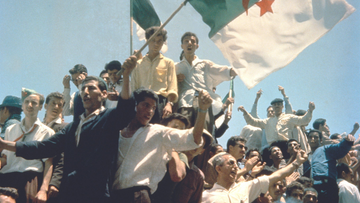The Algerian War of Independence, also known as the Algerian War, is a conflict that marked the history of North Africa in the 20th century. This fierce struggle for freedom lasted nearly eight years, from 1954 to 1962, and ultimately led to Algeria's independence from French colonial rule.
Origins of the Conflict
Algeria had been under French domination for more than a century, since the country's conquest in 1830. During this period, Algerian nationalism gradually took shape, driven by figures such as Messali Hadj and Ferhat Abbas. The rise of independence demands led to increasing tensions with the French colonial authorities.
On November 1, 1954, the National Liberation Front (FLN) launched a series of coordinated attacks against French targets, marking the beginning of the war of independence. This event, known as "Red All Saints' Day," triggered a bloody conflict that would last nearly eight years.
The Course of the War (1954-1962)
After the outbreak of hostilities, the FLN quickly organized into a true national liberation army, the National Liberation Army (ALN). It conducted a relentless guerrilla war against French forces, relying on the civilian population and clandestine networks.
The years 1955-1957 were marked by violent clashes, particularly during the Battle of Algiers, where French forces tried to crush the rebellion through brutal repression. However, despite these setbacks, the national liberation movement gained momentum and legitimacy, both nationally and internationally.
Key Figures of the Revolution
Among the prominent figures of the Algerian War of Independence are Ahmed Ben Bella, Houari Boumédiène, Krim Belkacem, and Ferhat Abbas. These political and military leaders played a crucial role in conducting the armed struggle and negotiating the independence agreements.
It is also important to highlight the critical role played by Algerian women in the revolution. They actively participated in the fighting and in logistical and intelligence support. Figures such as Djamila Bouhired and Djamila Boupacha became symbols of Algerian resistance.
International Dimensions of the Conflict
The Algerian War of Independence quickly took on an international dimension, with support from many Third World countries and the Soviet bloc for the Algerian cause. This internationalization of the conflict heavily influenced French policy, forcing negotiations with the FLN to end the war.
The Évian Accords and Independence
After years of fierce fighting, negotiations between the French government and the FLN culminated in the Évian Accords, signed on March 18, 1962. These accords provided for a referendum on self-determination in Algeria, which took place on July 1, 1962, resulting in a massive vote in favor of independence.
On July 5, 1962, Algeria officially proclaimed its independence, ending more than a century of French colonial rule. This date is now celebrated annually as Independence Day in Algeria.
Consequences and Legacy
The Algerian War of Independence had a profound impact on both Algeria and France. For Algeria, it marked the beginning of a new era, with the construction of an independent nation-state and the establishment of national institutions. However, the conflict also left deep scars, both economically and socially.
For France, the Algerian War was a major trauma, challenging its status as a colonial power. Debates on the recognition and memory of this conflict continue today, highlighting the historical importance of this war of independence.
Memory and Commemoration
The Algerian War of Independence has deeply marked the collective memory in both Algeria and France. Numerous literary, cinematic, and artistic works have been dedicated to this conflict, helping to perpetuate its memory.
Every year, July 5 is celebrated in Algeria as Independence Day, while France commemorates the end of the Algerian War on March 19, the date of the Évian Accords' signing. These commemorations reflect the historical importance of this war of independence and its lasting impact on both countries.
Conclusion
The Algerian War of Independence was a pivotal moment in 20th-century history, marking the end of the colonial era in North Africa. This fierce conflict allowed Algeria to achieve its freedom at the cost of many sacrifices. Today, the legacy of this war remains alive, both in the collective memory and in Franco-Algerian relations. The struggle for Algerian independence remains a powerful symbol of the resistance of peoples against colonial domination.






